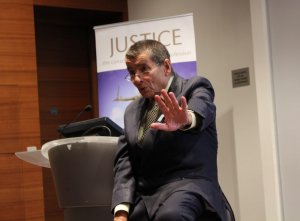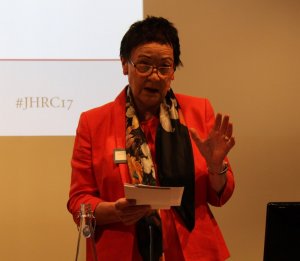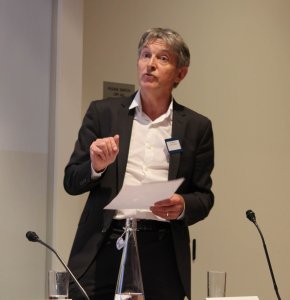With profound changes ahead for UK political life and the justice system, the 2017 Human Rights Law Conference on Friday 13 October was a chance for legal professionals to take stock of the year and look ahead to 2018.
Over 130 people attended the event which was hosted by Freshfields Bruckhaus Deringer in London.
The day began with a keynote speech from Dame Heather Hallett who spoke about how to bring about more effective participation in the justice system, from her perspective as a judge in the Court of Appeal.
She highlighted the importance of access to high quality advice and legal representation, particularly in the wake of cuts to legal aid. “People who once qualified for public funding find themselves trying to enforce their rights, or find themselves in proceedings that could have important repercussions for them, without representation,” she said.

Dame Heather called for a holistic review and a joined up approach to secure effective litigation funding in order and more effective participation in the justice system.
She finished her speech by talking about the importance of diversity in the legal profession. In this area she said there had been steady but slow progress but that more needed to be done to improve diversity in terms of race, gender and social mobility.
Dame Heather admitted her previous reluctance to take part in groups such as the Association of Women Barristers – of which she is now the President. Earlier in her career she thought that there was no longer a need for these kinds of organisations but admitted that there are still huge hurdles for many women, particularly those with caring responsibilities, when it comes to joining the legal profession and being retained within it.
“If the legal profession becomes the preserve of a narrow section of society – as it was when I was called to the Bar – our institutions will be greatly diminished,” she warned.
Following Dame Heather, Michael Fordham QC of Blackstone Chambers gave a lively and entertaining review of 2017’s human rights related Supreme Court judgments.
What is the point of human rights?

The day’s breakout sessions featured a line-up of impressive speakers on a range of topics. In the morning these were Criminal Justice & Human Rights, Judicial Review and Inquests & Inquiries. The afternoon sessions covered Immigration & Human Rights, Housing & Homelessness and Equality & Human Rights.
The afternoon keynote address came from Sir Geoffrey Nice QC, who took on the question: ‘What is the Point of International Human Rights?’
He highlighted that when things go horribly wrong, internationally recognised definitions mean that it should be easier to record human rights abuses and make states liable for persecution. He warned that there is a danger of moving towards a dilution of the universality of rights if the UK begins to use different terminology from the rest of the world.
Sir Geoffrey noted that international human rights have fallen down where victims and their families have been denied the right to know the full truth. Even if human rights abuses have been recorded that knowledge has not always been shared fully with the world at large. He said that there should be a ‘right to know’ and used the 1995 Srebrenica massacre, and the fight for families to get the full truth of what happened, as an example.
Human rights after Brexit
The afternoon finished with a cross party panel to discuss Brexit.
Sir Keir Starmer QC MP, Shadow Secretary of State for Exiting the European Union, began the session talking about what he sees as the prevailing ideology behind the campaign to leave the European Union – a deregulated, low tax, free trade Britain and that it isn’t just human rights that were under threat but a range of standards including workers’ rights and environmental protections.
Conservative MP and co-Vice President of the JUSTICE Council Dominic Grieve QC agreed that Brexit was driven by an ideology that didn’t prioritise internationalism but that his party colleagues in Parliament would insist that Brexit wasn’t an excuse to water down equalities.

Justice and Home Affairs spokesperson for the Scottish National Party, Joanna Cherry QC MP, said she welcomed the opportunity for cross party working that Brexit brings but that she was concerned that Brexit would be used to take away control that devolved parliaments have.
Baroness Sarah Ludford, a former Member of the European Parliament, Liberal Democrat Lords Spokesperson on Exiting the European Union and the other co-Vice President of the JUSTICE Council, called for a second referendum argued that the UK’s reputation as an upholder and promoter of international human rights had been damaged and would get worse after Brexit happens.
Professor Conor Gearty of the London School of Economics Department of Law gave his passionate and pessimistic prediction of a ‘no deal’ Brexit which would render the UK ‘panic stricken’ and eventually lead to a triumph of English nationalism, a triumph of sectarianism and a triumph of cost cutting. He also predicted an increase in attacks on minorities and scapegoating as the economy worsens
Gearty also argued that, in a continuation of a British colonial attitude, Ireland had not been taken seriously in Brexit discussions.
Many speakers – and audience members – said that there was a need to look at the UK’s constitution. Gearty and Cherry went so far as to say that it was ‘broken’ and Ludford called for a written Bill of Rights.
Starmer dismissed calls from Ludford and others for a second referendum saying that while he understood the emotional argument, talking about it was a false promise to anxious people who voted to remain in the EU. He argued that there would not be enough time to campaign and put everything in place. Other panel members felt another referendum could be possible but Cherry and Grieve both questioned that there was enough public appetite for it. The session ended with Gearty joking that the good news was that he was ‘frequently wrong’ and Grieve suggesting that everyone should ‘cheer up’.
Thank you to everyone who made this year’s conference possible, particularly the speakers and Freshfields Bruckhaus Deringer for hosting us for another year.
Electronic copies of speaker papers and PowerPoints are available below:
Breakout session 1: Criminal Justice and Human Rights Update
- Peter Carter QC paper
- Peter Carter QC presentation slides
- Malcolm Hawkes paper
- Malcolm Hawkes presentation slides
Breakout session 2: Judicial Review Update
Breakout session 3: Inquests and Inquiries
- Dijen Basu QC paper
- Dijen Basu QC presentation slides
- Deborah Coles presentation slides
- Matthew Hill paper
- Matthew Hill presentation slides
Breakout session 4: Immigration and Human Rights Update
Breakout session 5: Housing and Homelessness
- Sonia Birdee paper
- Sonia Birdee presentation slides
- Connor Johnston paper
- Connor Johnston presentation slides
Breakout session 6: Equality and Human Rights Update
- Alex Ruck Keene paper
- Alex Ruck Keene presentation slides
- Amanda Weston paper
- Amanda Weston presentation slides
There is more coverage of the conference on Twitter under #JHRC17
The full JUSTICE Human Rights Law Conference programme can be seen here (pdf)
